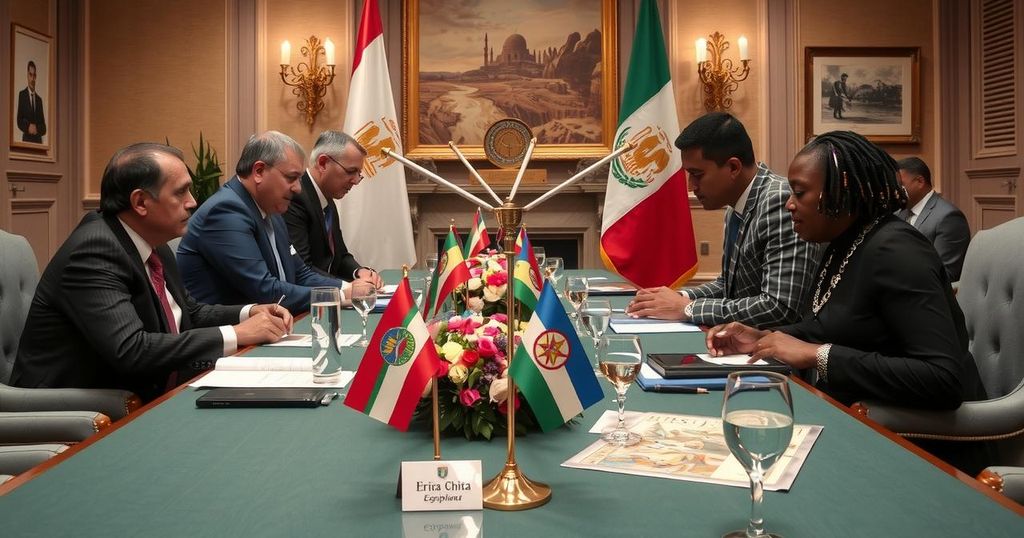Ethiopia aims to replace Somalia’s Foreign Minister Ahmed Fiqi, clashing with Egypt’s support for him, amid President Hassan Sheikh’s visit to Ethiopia to restore diplomatic ties. Fiqi is absent from this visit, focusing instead on meetings in Egypt. The fragile relations with Puntland and Jubaland further complicate Somalia’s geopolitical situation as outside influences from Egypt and Ethiopia loom significant.
The complex dynamics of Somalia’s foreign relations unfold as Ethiopia intensifies efforts to replace Somali Foreign Minister Ahmed Fiqi, a move currently facing opposition from Egypt. This political maneuver coincides with Somali President Hassan Sheikh Mohamud’s diplomatic visit to Ethiopia, aimed at reinforcing ties and restoring formal relations between the two countries. Notably, Foreign Minister Fiqi is absent from this visit, as he engages in crucial discussions in Egypt regarding a trilateral alliance with Egypt and Eritrea designed to counter Ethiopia’s regional sway.
The geopolitical landscape reveals tensions between the Somali Federal Government and its member states, particularly Puntland and Jubaland, which maintain significant relations with Ethiopia. Conversely, the Ethiopian government plays a vital role in bolstering Somalia’s security infrastructure, underlining the importance of unity amongst these nations. Egypt’s insistence on retaining Fiqi showcases its broader strategy to counterbalance Ethiopia’s growing influence, which is critical in the ongoing power struggle within the Horn of Africa.
Additionally, the administration of President Hassan Sheikh has faced criticism for its foreign policy, viewed as inconsistent and excessively influenced by personal affiliations rather than national interests. This criticism emphasizes the vulnerability of Somalia to external geopolitical machinations, as Egypt and Ethiopia both strive for dominance within the region. The fragile state of Somali politics reflects the ongoing rivalry in the Horn of Africa, stressing the need for a cohesive national strategy that prioritizes the nation’s integrity and stability.
The ongoing tensions within Somalia’s foreign policy and regional alliances can be traced to historical complexities and contemporary geopolitical ambitions. Ethiopia and Egypt represent significant influences in the region, each striving for leverage over Somalia, particularly in matters concerning security, diplomacy, and emerging alliances. The replacement of government officials like Foreign Minister Ahmed Fiqi symbolizes deeper issues regarding alignment with foreign interests versus national sovereignty. The relations among Somalia, Ethiopia, and the federal member states complicate the scenario further, as various factions vie for control and influence in shaping the country’s future.
In summary, the situation regarding Somalia’s foreign minister and diplomatic relations with Ethiopia highlights the intricate web of regional politics in the Horn of Africa. Ethiopia’s efforts to influence Somalia’s internal affairs, coupled with Egypt’s resistance to changes in the Somali government, reflect deeper geopolitical tensions. Furthermore, the criticism of President Hassan Sheikh’s foreign policy underscores the ongoing challenges faced by Somalia in navigating its multifaceted external relationships while maintaining its sovereignty. The fragility of the Somali political landscape demands a strategically cohesive approach to mitigate external interferences that threaten its stability and growth.
Original Source: www.garoweonline.com






